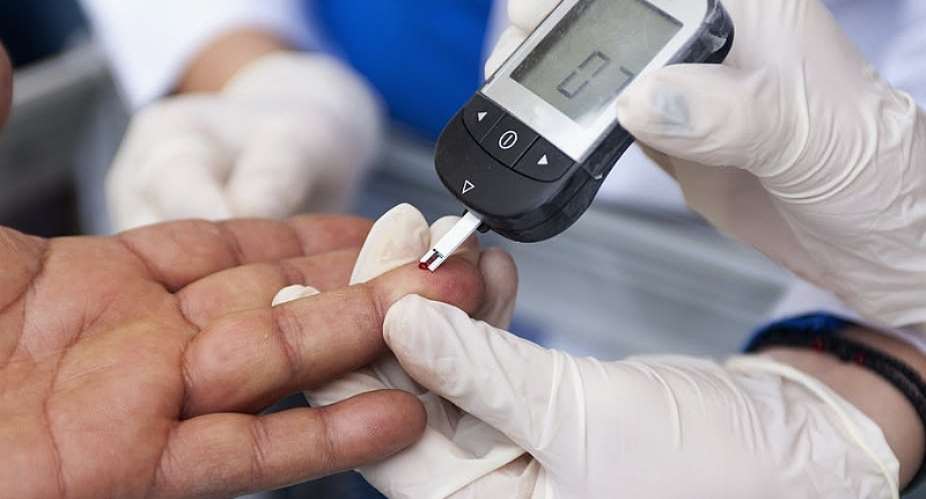Diabetes Mellitus (DM) is also known as Sugar Diabetes or Diabetes. The main problem is elevated sugar or glucose in the blood because the chemical or hormone called Insulin, which regulates Blood Sugar is ineffective, and the body’s cells are unable to use glucose to make energy for its use. The main hormones regulating blood sugar are Insulin and Glucagon and are produced by the pancreas. Insulin lowers blood sugar and glucagon raises it. The absence, deficiency or ineffectiveness of insulin leads to DM.
There are many types of DM but the three most common ones are Type 1 DM, Type 2 DM and Gestational Diabetes which is associated with Pregnancy; the commonest one is Type 2 Diabetes Mellitus, which occurs because the body’s cells are unable to effectively use the insulin it makes or absence/destruction of the cells which produce it. This occurs in both adults and children. There is increased association with Obesity. In Type 1 DM, the body is unable to produce its own insulin right from the onset. It is often diagnosed in childhood.
By the time an individual is diagnosed with DM Type 2, the individual may have already lost over 80% of their pancreatic cells that produce insulin. This loss may have started 10 years before the diagnosis was made.
Prediabetes
An individual may have Pre-Diabetes before developing full blown DM type 2. The blood sugar levels are between normal and Diabetes range.
Symptoms of Type 2 DM
- Frequent urination, thirst and drinking lots of water and fluids to quench thirst
- Blurred Vision and Dry Mouth
- Unintentional weight loss, tiredness, and weakness
- Frequent vaginal yeast infections in women and urinary tract infections
- Numbness and tingling of the lower extremities
- When several of these symptoms occur at the same time, they may be a sign of DM and one has to see a Health Care Provider.
Diagnosis
Typically, a blood test to check for one’s blood sugar, and how that has fared over the past 3 months (HgbA1c- Hemoglobin A1c or A1c) plus tests to check one’ kidney’s function, and other chemistry tests are usually carried out. A urine test will be done to diagnose if the DM has affected the kidneys.
Treatment of Diabetes Mellitus
Many people with DM can live a long enjoyable life, but this happens when there is shared management between patient and their doctor. Every patient has to take control of their disease. Do not just leave it to the doctor or nurse treating you. Everyone with DM, whether they are on medication or not, has to control their blood sugar with:
- Lifestyle Changes: These include healthy diet, exercising, weight loss if obese and try to cut back on alcohol and quit smoking if they do. Other important things to do include:
- Frequent checking of one’s blood sugar with a device called a glucometer
- Taking one’s medications as instructed, which may be oral, injections of insulin or non-insulin ones
- Keeping doctor’s appointments
- Having yearly eye exams to see if the DM has affected the eyes
- Control of other medical conditions like Hypertension, High Cholesterol and Kidney Disease
- Self-examination of one’s feet every night before going to bed with a help of a hand mirror
- Reporting any numbness or tingling in extremities to one’s doctor
- Know your numbers: Average fasting blood sugar, HgbA1c, Blood Pressure and Cholesterol numbers (A B C)
Complications of DM
- Heart and vascular Diseases (e.g. heart attacks, coronary artery disease, chest pain, blood vessels’ diseases)
- Stroke and Mini Stroke or TIA
- Kidney disease which if severe can cause kidney failure requiring dialysis
- Eye conditions resulting in vision loss or blindness
- Poor circulation in feet, foot ulcers, leading to amputations if they do not heal
- Skin changes like callouses, dry skin, color changes, itching and infections
- Nerve complications include numbness and tingling, burning or pain in legs
- Sexual problems include loss of libido/orgasm in females and erectile dysfunction in men
In conclusion, when blood sugar is well controlled, most of the symptoms and complications of Diabetes Mellitus are avoided. Take charge of your DM.
Dr. Barbara Entsuah (Family Physician, Author, Philanthropist)
www.Barbaraentsuah.com
#Loveyourbody ❤️❤️❤️





 We’ll no longer tolerate your empty, unwarranted attacks – TUC blasts Prof Adei
We’ll no longer tolerate your empty, unwarranted attacks – TUC blasts Prof Adei
 Bawumia donates GHc200,000 to support Madina fire victims
Bawumia donates GHc200,000 to support Madina fire victims
 IMF to disburse US$360million third tranche to Ghana without creditors MoU
IMF to disburse US$360million third tranche to Ghana without creditors MoU
 Truck owner share insights into train collision incident
Truck owner share insights into train collision incident
 Paramount chief of Bassare Traditional Area passes on
Paramount chief of Bassare Traditional Area passes on
 Two teachers in court over alleged illegal possession of BECE papers
Two teachers in court over alleged illegal possession of BECE papers
 Sunyani: Victim allegedly shot by traditional warriors appeals for justice
Sunyani: Victim allegedly shot by traditional warriors appeals for justice
 Mahama vows to scrap teacher licensure exams, review Free SHS policy
Mahama vows to scrap teacher licensure exams, review Free SHS policy
 Government will replace burnt Madina shops with a new three-story, 120-store fac...
Government will replace burnt Madina shops with a new three-story, 120-store fac...
